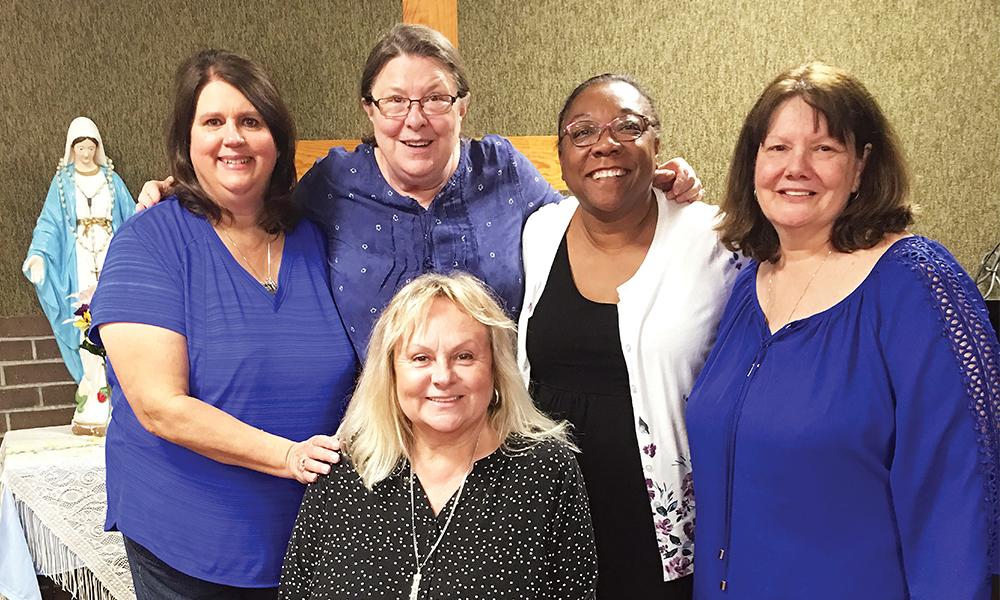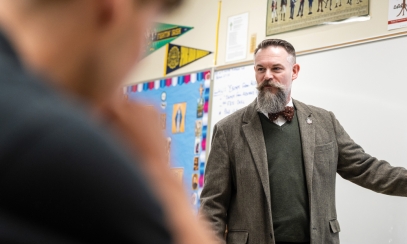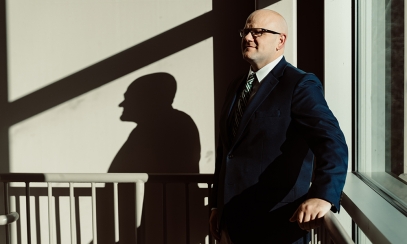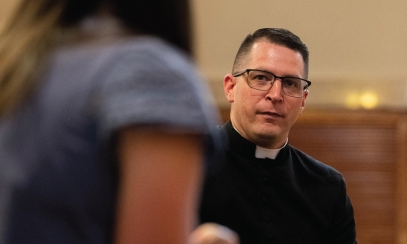
A Day in the Life of a Biblical Institute Student
Classes are two hours in length and held at various parishes for four years throughout the diocese, from September through May. Holiday breaks around Christmas and Easter are given to allow students to participate in their parish activities. We try to schedule classes on weekday evenings or Saturday mornings to accommodate work schedules.
In the first hour of a typical class, students pray together, with the prayers based on the Scripture we are studying at the time and are constructed by either the students or the teacher. Students then sit with the people who have been assigned to them as their group for the year. Typically, people become a faith support group member over the course of the year. After the prayer, the students break into table group discussion and go over the week’s homework questions.
In the first year, our book-based Bible study introduces students some of the books of the Hebrew Scriptures. Year two is an introduction to Christian Scriptures; students jump into the program in either year one or two and cycle through the four years from wherever they started. Each summer, students register for the next year.
There are generally five or six homework questions that students bring to class, covering what they read after having a presentation by their teacher on that material. Questions cover a variety of learning formats; some are content based in which a student looks up an answer in the Bible. Other questions ask the student to apply a teaching or idea in the Bible to current situations. Still other questions ask the student to evaluate what they think about an idea in the Bible. Here are sample questions from a unit covering the Book of Exodus 1-6:
1. Why did Pharaoh persecute the Hebrews? Cite a reference.
2. A. How did Moses respond to God’s call? Cite a reference.
B. How have you experienced a “call” in your life. Describe the experience.
3. A. Describe problems Moses faced freeing the Israelites. Cite references.
B. How are these problems similar to problems faced by those struggling for freedom and justice today?
In the second hour, the teacher presents new material that will explain the readings for the next week’s assignment. Students will have learned the type of writing the Book of Exodus is — a theological narrative. They will also hear about some of the conventions of writing in the Hebrew language. For example, students will notice as they read what scholars call doublets: when a story is told more than once by varying authors compiled together in the final narrative. The different versions then function in different ways within the story.
Here, for instance, the authors present Moses as receiving both an initial call and a renewed call. Such a double view presents a wonderful expression, both of the difficulties the new leader faced and of the support he received from God. This approach to writing is certainly not like ours, and if you don’t understand what the authors have in mind with including doublets, reading them can be confusing.
As you read, you’ll also notice how the story portrays Pharaoh. From the beginning, he’s shown as having absolute power. In fact, in ancient Egypt, a pharaoh DID have absolute power and was even seen as a God. So, from the first chapter, the story sets up a conflict to come between Pharaoh, the seeing God of Egypt, and Israel’s God. Notice, too, that the Pharaoh is not named. The story is not so much concerned with a particular pharaoh as with Pharaoh as a representative of the forces that constantly oppose the purposes of God.
Second, notice who first resist the power of Pharaoh: five women. In the ancient world, women were quite powerless, unless you happened to be a princess, as Pharaoh’s daughter is. The Hebrew Scriptures do not usually tell us the names of women. In the naming of the first two women who oppose Pharaoh, the Hebrew midwives, Shiphrah and Puah, the story remarkably emphasizes the most powerless acting on behalf of other powerless persons resisting ultimate power.
It also makes a nice literary suggestion: as those who aid birth, the midwives are the first to assist in the birth of Israel. It is, in fact, five women working subversively together — the midwives, the mother and sister of Moses, and even the daughter of Pharaoh — who preserve the life of the man who will become the first leader of the nation.
Third, the story asks us to reflect on who is called by God. By the end of chapter two, you can say that Moses is a “no one.” He’s been separated from his people, raised in a foreign culture, and when he tries to reestablish connection with his people, his authority is questioned: Who has appointed you ruler and judge over us? (Exodus 2:14). He’s forced to leave Egypt and marries into yet another people, the Midianites. Yet, it is this “no one” who will be called by God. And it is this “no one” who will have to fight for recognition from his people.
After Moses is called by God, there is a contrast in the story that illustrates ways of responding to God. Shiphrah and Puah, the midwives who refused to kill the Israelite baby boys, feared God and thus, without question, opposed Pharaoh. Moses, on the other hand, who was granted an experience of God, hesitated and objected to God’s call: He asked, “Who am I to do this? Who are you to ask me to do this? What if the people don’t believe me? And I can’t speak well anyway.”
These stories highlight a key theme of the Pentateuch – the first five books of the Bible, including Exodus – and of anyone oriented to God: the theme of divine grace and human responsibility. God calls, but we must respond.
- Register for Year 1 Saturday morning classes ( 9-11 a.m.) at Our Lady of Mercy Parish (Aurora); classes start Sept. 19.
- Register for Year 2 for Wednesday evening classes (7-9 p.m.) at the Cathedral of St. Raymond (Joliet); classes start Sept. 16.
- Go to www.dioceseofjoliet.org/bidj to register before the Sept. 30 deadline.
The Biblical Institute of the Diocese of Joliet
Dr. Joan Gorski is the program coordinator for the Biblical Institute of the Diocese of Joliet. Carlos Briceño recently interviewed her about the upcoming sessions of the institute. If you want to learn more or register, please go to www.dioceseofjoliet.org/bidj.
How will the coronavirus affect your fall semester?
Our classes normally meet one day a week for two hours from September through May. We generally remain at a parish site for the full four years of the program. Our brochure tells you where a site is in the four-year program. Depending upon what the virus does this fall, we will adjust our plans accordingly. The best-case scenario is that we will have our onsite classes meeting at their locations. (We are registering now for Year 1 classes, starting Saturdays from 9-11 a.m. at Our Lady of Mercy Parish in Aurora, and Year 2 classes on Wednesdays from 7-9 p.m. at the Cathedral of St. Raymond in Joliet). Should we need to shelter in place again, we will use Zoom to meet for classes. Not all people know how to Zoom, so we will teach our registrants how to do so on either their phone, laptop or home computer.
Why is it important during these uncertain times to study the Bible?
The Sacred writers give us God’s messages in the Bible. It is one of the two fonts of authority in our faith – the other being Tradition. All of our teachings about God, how to live with one another and within our environment, flow from the two fonts of our faith. When people are, or feel, isolated, it’s especially important to have God’s Word as an anchor. Throughout the Hebrew and Christian Scriptures, we can see the thread of God’s continual care for us and our world. Knowing God’s continual care is critical in uncertain times. It’s also not the first time pandemics have happened. The Bible often refers to it as “pestilence.” God has loved us through other times of pestilence as can be seen in some of the stories in the Bible.
How does studying the Bible help people in becoming a disciple?
The word “disciple” means “learner.” The Bible contains both the history of God’s actions with our parent faith (Judaism) and in the story of and teachings of Jesus. The Bible gives us so much of what our foundation is as we progress from being “learners” to “persons in mission” (“apostles”). That’s the faith journey of all of us, together, and as individuals. I believe the pandemic has really reminded us we are not just individuals in the world. We need being together as “Church.” The Bible’s people are the initial “Church” and the shoulders upon which we stand today.
What do you say to people who think that the Bible is just too difficult to read and understand?
I would say that they, like everybody just starting, need guidance. Many of the literary forms and devices used in the Bible are not used commonly today. As Vatican II tells us, the key to understanding it is in knowing how to read it. This is where the Biblical Institute and our teachers come in. They all have advanced degrees in Scripture and adult learning styles and are here to guide the students.
How will the Sunday readings change for people who take these courses?
I am going to quote a graduate of the program named David here: “The class makes the Mass come alive as never before.” From current student, Mary: “When I listen to the readings in Mass, I am more attentive and understand it more. ... This is life changing.”



